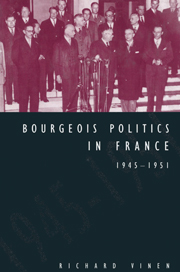Book contents
- Frontmatter
- Contents
- Preface
- List of abbreviations and French political groups
- 1 Introduction
- 2 A historiographic overview
- 3 International comparisons
- 4 Notables
- 5 Bourgeois parties and the female electorate
- 6 Organized business and politics
- 7 Administration
- 8 Opposition nationale
- 9 The Parti Républicain de la Liberté
- 10 Machine à ramasser les Pétainistes? The Mouvement Républicain Populaire and the conservative electorate
- 11 The Rassemblement des Gauches Républicaines
- 12 The Rassemblement du Peuple Français
- 13 Independents and Peasants
- 14 The Groupement de Défense des Contribuables
- 15 Conclusion
- Appendix. The electoral law of 1951 and apparentements
- Bibliography
- Index
6 - Organized business and politics
Published online by Cambridge University Press: 06 July 2010
- Frontmatter
- Contents
- Preface
- List of abbreviations and French political groups
- 1 Introduction
- 2 A historiographic overview
- 3 International comparisons
- 4 Notables
- 5 Bourgeois parties and the female electorate
- 6 Organized business and politics
- 7 Administration
- 8 Opposition nationale
- 9 The Parti Républicain de la Liberté
- 10 Machine à ramasser les Pétainistes? The Mouvement Républicain Populaire and the conservative electorate
- 11 The Rassemblement des Gauches Républicaines
- 12 The Rassemblement du Peuple Français
- 13 Independents and Peasants
- 14 The Groupement de Défense des Contribuables
- 15 Conclusion
- Appendix. The electoral law of 1951 and apparentements
- Bibliography
- Index
Summary
Historians have made much of the power that organized business exercised in the Fourth Republic. Georgette Elgey entitled a section of a chapter on the 1951 election ‘L'église et le patronat interviennent’, and numerous commentators repeated the allegation that every successful candidate in that election had received 50,000 francs of business subsidy. This perception of business power is increased by the anti-capitalist perspective of many Fourth Republic writers, and by the magnifying power of repeated gossip.
Hard information about the political influence of the patronat is hard to come by, but it is worth beginning by making three general points. Firstly, in spite of the alleged power of big business in France, there was not a single political party that was willing to present itself as a defender of big business. In post-war Britain, the Conservative party openly claimed to be the spokesman of business. Subsidies to the party were declared in company accounts and substantial donors were rewarded with honours. In America, the assumption that business interests, and particularly big business interests, ran parallel to those of the rest of the nation was even more widespread: both major political parties expressed this point of view and individual companies often chose the recipients for their largesse on the basis of specific advantages offered to certain kinds of activity. In France, by contrast, all parties expressed some degree of hostility to large-scale business.
- Type
- Chapter
- Information
- Bourgeois Politics in France, 1945–1951 , pp. 56 - 81Publisher: Cambridge University PressPrint publication year: 1995

